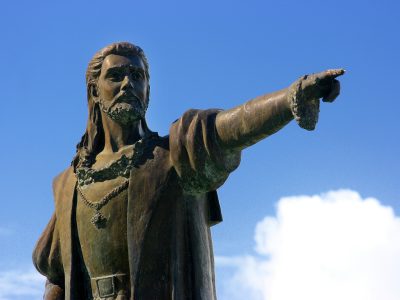The Age of Exploration, a pivotal era from the late 15th to the early 17th century, marked a time of unprecedented global exploration initiated by European powers. This period, driven by the desire for new trade routes, wealth, and the spread of Christianity—summarised by the pursuit of “God, Gold, and Glory“—led to the discovery of new lands, the exchange of cultures, and the onset of globalisation. This article delves into the explorations, technological advancements, impacts on indigenous peoples, economic consequences, and the lasting legacy of this transformative era.
Early explorers and expeditions

The Age of Exploration kicked off with the Portuguese voyages along the African coast, led by Prince Henry the Navigator. These expeditions aimed to find a sea route to India to bypass the overland trade routes controlled by the Ottomans. Notably, Bartolomeu Dias rounded the Cape of Good Hope in 1488, and Vasco da Gama reached India in 1498, establishing a sea route that would become crucial for the spice trade.
Christopher Columbus’s 1492 voyage, funded by Spain, aimed to find a westward route to Asia but instead stumbled upon the Americas, opening a new world for European exploration and conquest. John Cabot’s expeditions under the English flag to North America and subsequent explorers like Amerigo Vespucci further mapped and claimed territories for their European patrons.
Technological advances
The Age of Exploration was fueled by significant technological innovations. The development of the magnetic compass, astrolabe, and later the sextant enabled navigators to determine their position at sea more accurately. Ship designs evolved with the introduction of the caravel, a small, highly manoeuvrable ship, and the carrack, a larger vessel capable of long sea voyages. These advancements and the creation of more accurate maps made longer expeditions feasible and safer.
Impact on Indigenous Peoples
The arrival of Europeans in the New World had profound and often devastating effects on indigenous populations. Initial encounters, characterised by curiosity and exchange, soon turned into violent conquests. Diseases such as smallpox, to which the native people had no immunity, caused massive declines in indigenous numbers, reshaping the demographic landscape of the Americas. The cultural impact was equally significant, with European settlers imposing their languages, religions, and customs, often through coercive means.
Economic consequences
The Age of Exploration opened up new trade routes, particularly in spices, which were highly valued in Europe for their use in preserving and flavouring food. The influx of precious metals, especially gold and silver from the Americas, into Europe, had a profound impact on the European economy, leading to inflation but also contributing to the rise of mercantilism. This economic theory, which advocated for increasing wealth through a favourable balance of trade, shaped European colonial policies for centuries.
Social and cultural effects
One of the most significant outcomes of the Age of Exploration was the Columbian Exchange, the widespread transfer of plants, animals, foods, human populations, and diseases between the Old and New Worlds. This exchange drastically altered agriculture, diets, and ways of life on both sides of the Atlantic. The introduction of crops like potatoes, tomatoes, and maise to Europe and wheat, horses, and cattle to the Americas are just a few examples of how the Columbian Exchange reshaped global societies.
The role of empires
The Portuguese and Spanish Empires initially dominated the Age of Exploration, establishing vast overseas territories and trade networks. However, other European powers, including England, France, and the Netherlands, soon entered the fray, seeking their own colonies and trade routes. This competition led to the colonisation of the Americas, Africa, and Asia, setting the stage for centuries of European imperialism.
Legacy of the Age of Exploration
The Age of Exploration laid the groundwork for the modern globalised world. It marked the beginning of European dominance in world affairs, which would continue into the 20th century. However, this era also has a controversial legacy, given the exploitation and suffering of indigenous peoples. Today, there is a growing recognition of the need to reevaluate the Age of Exploration, acknowledging its contributions to global connectivity and its darker aspects, including the slave trade.
Conclusion
The Age of Exploration was a transformative period that reshaped the world in profound ways. It was an era of remarkable voyages, technological advancements, and cultural exchanges but also of conquest, exploitation, and irreversible changes to indigenous societies. As we reflect on its historical significance, the lessons of the Age of Exploration continue to inform our understanding of globalisation, cultural exchange, and the complexities of human history.





